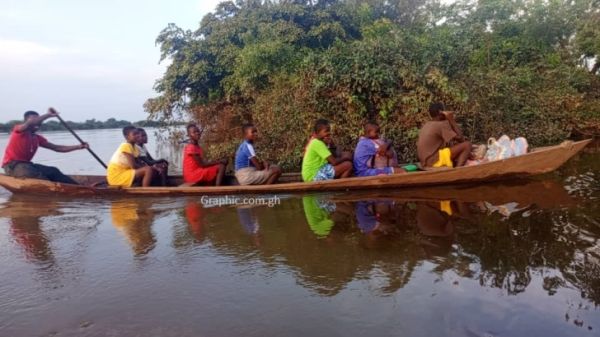The overflow of the River Oti has brought education in the Kucha Electoral Area of the Saboba District of the Northern Region to a standstill, forcing fisherfolk to convert an abandoned school building into a workshop for mending nets.
For three months, students from eight communities—Kucha, Butuin Upper, Butuin Lower, Moagbar, Kunjib, Kacheen, Kibonboni, and Lomok—have had no access to teachers, disrupting their education and leaving many to either accompany their parents to farms or wander the community aimlessly.
The absence of outboard motors, which could provide teachers with a safe means to cross the river from the district capital, Saboba, has only worsened the situation. Community members recall a tragic incident three years ago, when a canoe capsized, resulting in the deaths of nine students. This tragedy has left lasting scars on the community and has led to calls for life jackets and safer modes of transportation.
Batuu Barnabas, a Form Two student, told Graphic Online that the prolonged absence of teachers has severely impacted students. He shared how many of his peers are turning to farming or other unproductive activities rather than attending school, as they feel teachers won’t be there to teach them even if they show up.
“As we speak, it’s been three months without teachers, and we’re supposed to write our end-of-term exams—and even the B.E.C.E.—but we’re falling behind. When we fail the exams, who will take responsibility—our teachers or the government? We are appealing to the government, the Saboba District Assembly, our parliamentary candidates, and other Ghanaians to support our area with an outboard motor to make transportation safer and reduce the dangers of crossing the river in small dugout canoes,” he urged.
Fisherman Njorfuni Silas explained that he and his brothers have temporarily converted the school into a workshop to mend their fishing nets. “Since the flooding started, there have been no school activities here. Today is Friday, and our brothers and sisters should be in class. But no teachers have come since August, so we decided to use the school grounds to mend our nets and prepare to go fishing,” he said.
Adam Gmalaye Njabidam, Assemblyman for Kucha Electoral Area, expressed frustration over the annual disruption of education in the area, a situation he believes the district authorities have neglected. Despite repeated appeals, no lasting solution has been found. “If we had engine boats, they could be stationed at key points, allowing safe access across the river at any time,” he said. Njabidam also called for the construction of teachers’ quarters in communities with schools, so teachers can reside there rather than cross the river daily without life jackets.
The District Chief Executive (DCE) of Saboba, George Bingrini Kitinkawan, acknowledged the challenges facing residents of Kucha, especially given recent natural disasters and infrastructure gaps, though he stated that the current education disruption had not come to his attention. Kitinkawan expressed concerns over the lack of safe transportation for river crossings, particularly during rainy seasons, and announced plans to procure an outboard motor and life jackets to prevent fatalities and improve access to essential services.
“Educational disruptions hadn’t yet reached my attention. However, severe flooding has made travel hazardous, with many teachers hesitant to cross the river daily. I’ll consult the Education Director to verify if school activities have indeed been halted,” he said.
The DCE also emphasized plans to construct teacher housing within Kucha communities to reduce the need for daily river crossings. “We aim to include funding for teachers’ housing in our 2025 annual budget, enabling teachers to live near schools and improving educational access,” he added.
Source: graphiconline
| Disclaimer: Opinions expressed here are those of the writers and do not reflect those of Peacefmonline.com. Peacefmonline.com accepts no responsibility legal or otherwise for their accuracy of content. Please report any inappropriate content to us, and we will evaluate it as a matter of priority. |
Featured Video














